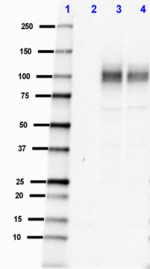- Clone
- M3.2 (See other available formats)
- Regulatory Status
- RUO
- Other Names
- AAA, ABETA, ABPP, AD1, APPI, CTFgamma, CVAP, PN-II, PN2, Amyloid beta A4 protein, preA4, protease, peptidase nexin-II, beta-amyloid peptide, alzheimer disease amyloid protein, cerebral vascular amyloid peptide, APP, Amyloid Precursor Protein
- Previously
-
Covance Catalog# SIG-39156
- Isotype
- Mouse IgG1, κ
- Ave. Rating
- Submit a Review
- Product Citations
- publications
| Cat # | Size | Price | Quantity Check Availability | Save | ||
|---|---|---|---|---|---|---|
| 805704 | 1 mL | 2270 CHF | ||||
| 805703 | 200 µL | 652 CHF | ||||
Alzheimer's disease is characterized by the accumulation of aggregated Aβ peptides in senile plaques and vascular deposits. Aβ peptides are derived from amyloid precursor proteins (APP) through sequential proteolytic cleavage of APP by β-secretases and γ-secretases generating diverse Aβ species. Aβ can aggregate to form soluble oligomeric species and insoluble fibrillar or amorphous assemblies. Some forms of the aggregated peptides are toxic to neurons.
Product DetailsProduct Details
- Verified Reactivity
- Mouse, Rat
- Antibody Type
- Monoclonal
- Host Species
- Mouse
- Immunogen
- The epitope has been determined to be within residues 10-15 of murine Aβ.
- Formulation
- Phosphate-buffered solution; no preservatives or carrier proteins.
- Preparation
- The antibody was purified by affinity chromatography.
- Concentration
- 1 mg/mL
- Storage & Handling
- The antibody solution should be stored undiluted between 2°C and 8°C. Please note the storage condition for this antibody has been changed from -20°C to between 2°C and 8°C. You can also check your vial or your CoA to find the most accurate storage condition for this antibody.
- Application
-
WB - Quality tested
ICC - Reported in the literature, not verified in house
ELISA - Recommended Usage
-
Each lot of this antibody is quality control tested by western blotting.
The optimal working dilution should be determined for each specific assay condition.
• WB: 1:50,000-1:200,000
• IF: 1:1,000-1:2,000 - Application Notes
-
Clone M3.2 recognizes a rodent sequence of Aß, ß-CTF, sAPP-a, and full length APP. Clone 3.2 has negligible cross reactivity with human isoforms of APP and beta amyloid.
- Additional Product Notes
-
Expected MW: APP & sAPPalpha = 100 kD, Beta-CTF = 10 kD, Beta Amyloid = 4 kD
-
Application References
(PubMed link indicates BioLegend citation) -
- Morales-Corraliza J, et al. 2009. PLoS One 4(9):e7134. (IP, WB, ELISA Detection)
- Teich AF, et al. 2013. PLoS One 8(2):e55647, 2013. (ELISA Capture, WB)
- Lee Y, et al. 2017. Neuropharmacology. 117:387-400. (ICC)
- Lundgren JL, et al. 2015. J Neurochemistry. 135:606-15. (ICC)
- Product Citations
-
- RRID
-
AB_2564983 (BioLegend Cat. No. 805704)
AB_2564983 (BioLegend Cat. No. 805703)
Antigen Details
- Structure
- Amyloid precursor protein is a 770 amino acid protein with a molecular mass of ~100 kD. According to the UniProtKB database, APP (ID# P05067) has 11 isoforms (34 to ~90 kD) and the 770 form has been designated as the canonical form. Isoform APP695 is the predominant form expressed in neuronal tissue. Isoforms APP751 and APP770 are widely expressed in non-neuronal cells. Isoform APP751 is the most abundant form in T-lymphocytes. Aβ denotes peptides of 36-43 amino acids generated from cleavage of APP by secretases. Aβ has an apparent molecular mass of about 4 kD.
- Distribution
-
Tissue sources: Primarily nervous system, but also adipose tissue, intestine, muscle.
Distribution: Cytosol, endosomes, nucleus, plasma membrane, extracellular, and golgi apparatus.
- Function
- The normal function of Aβ is not well understood. Several potential physiological roles have been proposed, including: activation of kinase enzymes; protection against oxidative stress; regulation of cholesterol transport; transcription factor, and as an anti-microbial agent.
- Biology Area
- Cell Biology, Neurodegeneration, Neuroscience, Protein Misfolding and Aggregation
- Molecular Family
- APP/β-Amyloid
- Antigen References
-
- Kumar A, et al. 2015. Pharmacol. Rep. 67(2):195.
- Sadigh-Eteghad S, et al. 2015. Med. Princ. Pract. 24(1):1.
- Hampel H, et al. 2015. Expert Rev. Neurother. 15(1):83.
- Puig KL, Combs CK. 2013. Exp. Gerontol. 48(7): 608.
- Selkoe DJ, Hardy J. 2016. EMBO Mol. Med. 8(6):595.
- Walsh DM, Selkoe DJ. 2007. J. Neurochem. 101(5):1172.
- Gene ID
- 351 View all products for this Gene ID
- UniProt
- View information about beta-Amyloid 1-16 on UniProt.org
Related Pages & Pathways
Pages
Related FAQs
- How many biotin molecules are per antibody structure?
- We don't routinely measure the number of biotins with our antibody products but the number of biotin molecules range from 3-6 molecules per antibody.
Other Formats
View All β-Amyloid, 1-16 Reagents Request Custom Conjugation| Description | Clone | Applications |
|---|---|---|
| Biotin anti-mouse/rat β-Amyloid, 1-16 | M3.2 | WB,ICC,ELISA |
| Purified anti-mouse/rat β-Amyloid, 1-16 | M3.2 | WB,ICC,IP,ELISA Detection,ELISA Capture |
Compare Data Across All Formats
This data display is provided for general comparisons between formats.
Your actual data may vary due to variations in samples, target cells, instruments and their settings, staining conditions, and other factors.
If you need assistance with selecting the best format contact our expert technical support team.
-
Biotin anti-mouse/rat β-Amyloid, 1-16
-
Purified anti-mouse/rat β-Amyloid, 1-16

Western blot of purified anti-mouse/rat β-Amyloid, 1-16 anti...
 Login / Register
Login / Register 












Follow Us